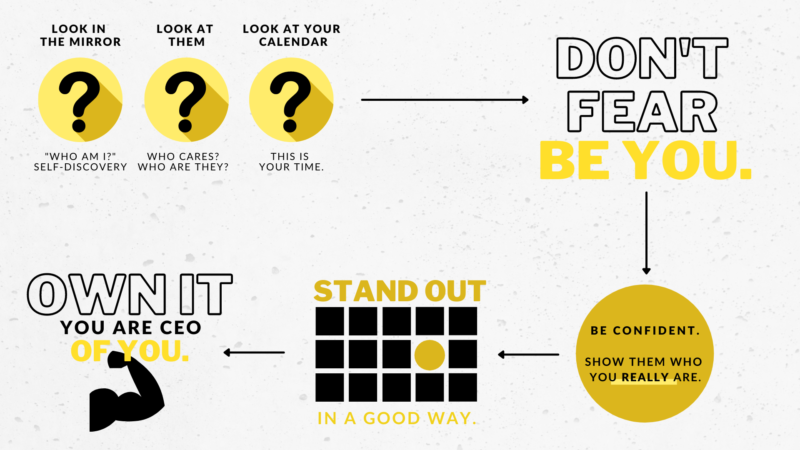How you choose to spend your time and resources today will play a predominant role in what your future looks like. It’s easier to see a future of success and think to yourself “sure, I’ll do these things eventually when I feel they’re more important,” rather than investing the time now to build the foundation to your brand – which if done correctly, will pave your path to success. “But I’m not a brand.” Take that ideology and toss it. You are the CEO of you. Consider yourself a business. No one is going to build your brand (or run your business) without your willingness and commitment.
It doesn’t matter what your story is, how many followers you have, or whether or not you have interests outside of the sport – you are a brand. So, what will you do today to open the doors of opportunity when it’s time to transition into a new chapter? There are a lot of misconceptions about what personal branding really is, so let’s take a deeper dive to clear things up. Here are three common misconceptions, especially amongst athletes:
MISCONCEPTION 1
“Personal branding means that I need to create an image.”
That’s just a fraction of what matters. Personal brands are not fabricated, they’re based in the reality. So, when you’re following influencers or other personal brands on social media, don’t try and replicate what they’re doing. Learn from them to understand how you want to engage yourself as a brand. Everyone has their unique voice and messaging that can be communicated in many different ways. Focus on you. Less comparing, more constructing.
You’ll want to focus internally to figure out what it is that you’re all about – beyond the sport. Many athletes aren’t sure how to start, and feel they don’t have a unique story or bold personality to craft a brand around. Repeat after me: that does not matter. You have a story, every human does. Whether you’re on the power play in the NHL, or 3rd shifter at your college, you have a unique story to tell and value to add to humanity. For sure, your sport is a huge part of who you are, but you are in fact more than an athlete.
What do you have to offer others? Everyone has something, whether it’s a hobby that you’re really good at, a craft, a passion, a skill set…
It’s likely there are golden nuggets in your story that you haven’t quite identified yet, which could resonate well with your audience. Maybe there’s a life lesson learned, or something in an experience that you’ve gone through that can help others. Those are the things that matter, and those are the things that we can help athletes unveil.
MISCONCEPTION 2
“Personal branding can water down or sabotage the company brand.”
Athletes who invest their time to build a brand and strategically, consistently amplify who they are, and what they do, beyond the athlete is helping the organization that they’re a part of. Often we hear hesitation from athletes who fear positioning themselves as a ‘big shot’ when they’re so engrained in the team mindset and culture, and additionally don’t want to rub their organization the wrong way.
Here’s a great example. If you play for a professional organization, and you have hesitation about building out your personal brand, fearing that you’re going to be perceived as selfish or a me-monster, you’re in the wrong train of thought. Your team needs you to build your brand. You’re not being disloyal. You’re helping grow a community. You’re helping grow engagement and interest around the organization that you’re a part of. So, this isn’t player or team. This is player and team. You’re helping each other.

MISCONCEPTION 3
“Personal branding is synonymous with pumping your own tires.”
It can be true in some cases (I’m sure you’re thinking of a very specific account or influencer with that statement), but here’s the difference: as long as you’re being authentic to who you are, that’s all that matters. Yes, there are some public figures on social media that may be amplifying their brands in a way that doesn’t sit well with you or others. That’s ok. Let them do their thing, and you do yours the way you want it to be done. I know the word authenticity is a little bit saturated; it’s a little bit cliché, but it’s a word that needs to fuel your content and presence. If anyone doesn’t like it, they can unfollow you, right? Who cares what they think? Those that will stick around and support your brand are the only ones you should care about or engage with.
SHOW, don’t just tell. Actions speak louder than words. Use your voice, but also show your audience what you’re doing behind the scenes that supports your message. A great example of this is the brand Patagonia. They are on a mission to save the planet. They use their voice, their community, and all their resources to help climate change. So, they’re not just pushing out this product or saying, “This is great, and this is why you need to wear this jacket.” They’re telling a story of who they are, what they value, and what’s most important to them. They’re showing people how they’re doing that and what they’re doing behind the scenes. And that is a successful brand strategy. Your mission might not be as powerful or distinct as this, but if you’re going to talk-the-talk you’ll need to walk-the-walk.
Let’s reiterate: you are more than athlete. Yes, the career that you’ve had, all these accomplishments, your successes are milestones and massive accomplishments, all of which you should be proud of. That’s part of your story, but it’s just part of it. So if you’re stuck trying to navigate that and say, “Well, who am I beyond an athlete? I love the sport that I play, and that’s about it.” Know that there’s always more.
You’ve got to dig deeper, and we’re here to help you build a brand that leverages your athletic influence and ignites your personal influence. Allowing you to find success when the game is done. You’re bigger than the sport you’re playing. Which path will you take?
Author: Meg Smith
Head of Marketing, Torch

